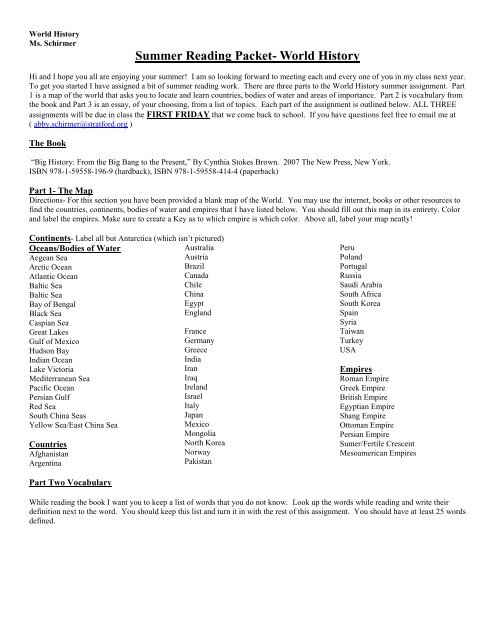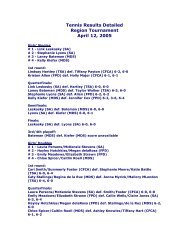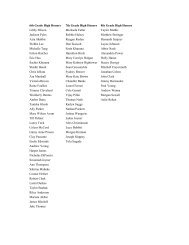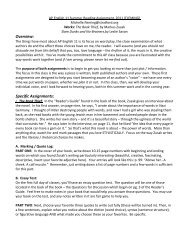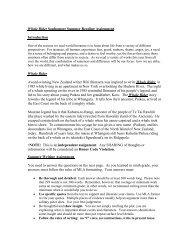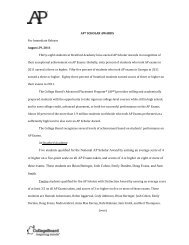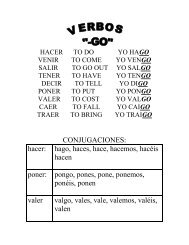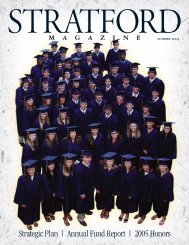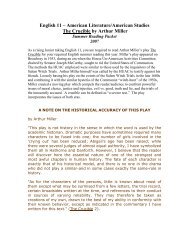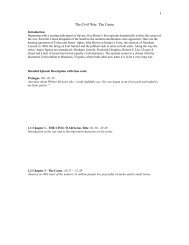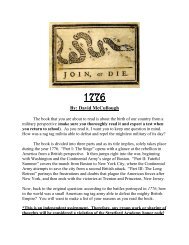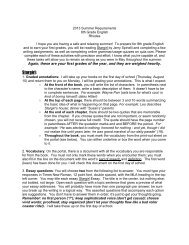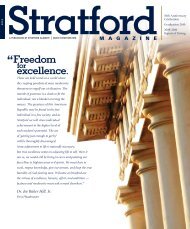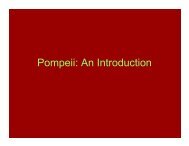Summer Reading Packet- World History
Summer Reading Packet- World History
Summer Reading Packet- World History
Create successful ePaper yourself
Turn your PDF publications into a flip-book with our unique Google optimized e-Paper software.
<strong>World</strong> <strong>History</strong><br />
Ms. Schirmer<br />
<strong>Summer</strong> <strong>Reading</strong> <strong>Packet</strong>- <strong>World</strong> <strong>History</strong><br />
Hi and I hope you all are enjoying your summer! I am so looking forward to meeting each and every one of you in my class next year.<br />
To get you started I have assigned a bit of summer reading work. There are three parts to the <strong>World</strong> <strong>History</strong> summer assignment. Part<br />
1 is a map of the world that asks you to locate and learn countries, bodies of water and areas of importance. Part 2 is vocabulary from<br />
the book and Part 3 is an essay, of your choosing, from a list of topics. Each part of the assignment is outlined below. ALL THREE<br />
assignments will be due in class the FIRST FRIDAY that we come back to school. If you have questions feel free to email me at<br />
( abby.schirmer@stratford.org )<br />
The Book<br />
“Big <strong>History</strong>: From the Big Bang to the Present,” By Cynthia Stokes Brown. 2007 The New Press, New York.<br />
ISBN 978-1-59558-196-9 (hardback), ISBN 978-1-59558-414-4 (paperback)<br />
Part 1- The Map<br />
Directions- For this section you have been provided a blank map of the <strong>World</strong>. You may use the internet, books or other resources to<br />
find the countries, continents, bodies of water and empires that I have listed below. You should fill out this map in its entirety. Color<br />
and label the empires. Make sure to create a Key as to which empire is which color. Above all, label your map neatly!<br />
Continents- Label all but Antarctica (which isn’t pictured)<br />
Oceans/Bodies of Water<br />
Australia<br />
Aegean Sea<br />
Austria<br />
Arctic Ocean<br />
Brazil<br />
Atlantic Ocean<br />
Canada<br />
Baltic Sea<br />
Chile<br />
Baltic Sea<br />
China<br />
Bay of Bengal<br />
Egypt<br />
Black Sea<br />
England<br />
Caspian Sea<br />
Great Lakes<br />
Gulf of Mexico<br />
Hudson Bay<br />
Indian Ocean<br />
Lake Victoria<br />
Mediterranean Sea<br />
Pacific Ocean<br />
Persian Gulf<br />
Red Sea<br />
South China Seas<br />
Yellow Sea/East China Sea<br />
Countries<br />
Afghanistan<br />
Argentina<br />
France<br />
Germany<br />
Greece<br />
India<br />
Iran<br />
Iraq<br />
Ireland<br />
Israel<br />
Italy<br />
Japan<br />
Mexico<br />
Mongolia<br />
North Korea<br />
Norway<br />
Pakistan<br />
Peru<br />
Poland<br />
Portugal<br />
Russia<br />
Saudi Arabia<br />
South Africa<br />
South Korea<br />
Spain<br />
Syria<br />
Taiwan<br />
Turkey<br />
USA<br />
Empires<br />
Roman Empire<br />
Greek Empire<br />
British Empire<br />
Egyptian Empire<br />
Shang Empire<br />
Ottoman Empire<br />
Persian Empire<br />
Sumer/Fertile Crescent<br />
Mesoamerican Empires<br />
Part Two Vocabulary<br />
While reading the book I want you to keep a list of words that you do not know. Look up the words while reading and write their<br />
definition next to the word. You should keep this list and turn it in with the rest of this assignment. You should have at least 25 words<br />
defined.
<strong>World</strong> <strong>History</strong><br />
Ms. Schirmer<br />
Part Three Essays<br />
Below are three essay topics. You are to choose ONE. As you read the book take notes on your topic. When you have finished, use<br />
this information to construct a 3 page essay which answers the questions asked. This essay should be typed, double spaced using 12<br />
point Times New Roman font and 1 inch margins.<br />
1. Trade- In the book you will learn that though major civilizations developed independently of each other, they were still<br />
connected by major trade networks. By increasing trade, these networks brought economic wealth but also cultural change (a<br />
process called cultural diffusion) which led to changes in beliefs, language, and religion. In your essay, write about one trade<br />
network from three different time periods. For each trade net work you choose, explain how the network spread new ideas<br />
about the proper way to live, different languages and different religious ideas to the civilizations that were part of the network.<br />
For the network you chose in each of the three 3 time periods, be sure to explain how the civilizations interacted wither each<br />
other using specific examples from the book.<br />
2. Agriculture- The transition from hunter-gathering to farming societies was among the most advancements in human history.<br />
In your essay, explain the causes of this transition. Also explain why the transition happened in certain regions of the world<br />
earlier than it happened in others. Explain what advantages the transition to agriculture brought to the societies which were<br />
able to embrace it. Conclude by explaining how did the development of farming lead to the development of more<br />
specialized jobs, written language, organized religion, stronger government and large militaries.<br />
3. Environment- Over the course of history, humans have exploited the natural environment for resources. In using the natural<br />
environment, human societies have seldom considered the damage that their action might cause for the natural environment.<br />
In your essay, write about two examples of human societies significantly altering the natural environment. Make sure that<br />
each of the examples you choose comes from different time periods and, using details from the book, describes how humans<br />
altered the environment. Describe positive and negative consequences of how humans altered the environment in each time<br />
period. Conclude your essay by describing how the environmental changes made by each of the human societies led to its<br />
collapse.
<strong>World</strong> <strong>History</strong><br />
Ms. Schirmer


